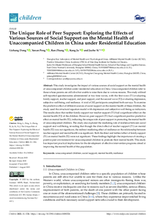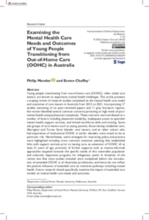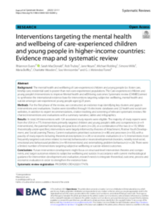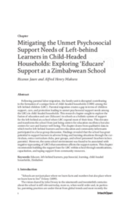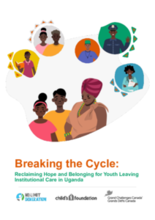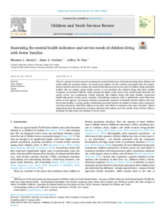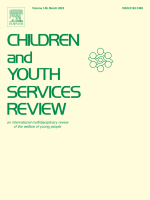Displaying 11 - 20 of 506
This study investigates the impact of various sources of social support on the mental health of unaccompanied children under residential education in China. Unaccompanied children refer to those whose parents are still alive but unable to raise them due to various reasons.
This article presents a scoping review of research studies completed on the mental health care needs and outcomes of care leavers in Australia from 2015 to 2021.
This global systematic review aimed to synthesise the international evidence base for interventions targeting subjective wellbeing, mental health and suicide amongst care-experienced young people aged ≤ 25 years.
This research chapter sought to explore the fusion of education and care in schools in Zimbabwe as a holistic system of support for the left-behind at a school where left-behind children expend most of their time.
This exploratory, sequential, mixed-methods study analyses factors that enhance the provision of psychosocial support services and the perceptions of educators towards psychosocial support delivery to orphaned and vulnerable learners in Eswatini.
The aim of the study is to investigate the interactive influence of depression on left-behind and non-left-behind children in China from the perspective of peer effects. The roles of teachers, parents, and friends are also explored.
This study sought to explore the prevalence of depression among orphaned adolescents in the selected children’s homes in Githurai Division, Nairobi County.
This is an introduction to the training series produced by Child's i Foundation and No Limit Generation and focuses on four key areas: trauma and stress, depression and suicidal thoughts, anxiety, and loss and grief.
This study utilized a large sample of treatment-seeking children across Ontario to compare children living with a foster family to non-foster children, across a number of psychosocial, care needs, and demographic variables.
This Children and Youth Services Review study performed a systematic review of research on training programs aiming the fostering of emotional and mental health in residential youth care. A systematic search was conducted in nine digital databases and other sources (websites, relevant journals, reference lists of included articles and relevant reviews), for publications from 1980 to 2021.

